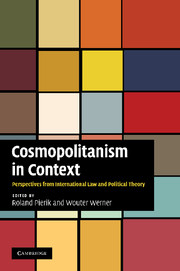Book contents
- Frontmatter
- Contents
- 1 Cosmopolitanism in context: an introduction
- Part I Environmental protection
- Part II World Trade Organization
- 4 The WTO/GATS Mode 4, international labor migration regimes and global justice
- 5 Incentives for pharmaceutical research: must they exclude the poor from advanced medicines?
- Part III Collective security and intervention
- Part IV International Criminal Court
- Part V International migration
- Part VI Conclusion
- Index
- References
4 - The WTO/GATS Mode 4, international labor migration regimes and global justice
Published online by Cambridge University Press: 06 December 2010
- Frontmatter
- Contents
- 1 Cosmopolitanism in context: an introduction
- Part I Environmental protection
- Part II World Trade Organization
- 4 The WTO/GATS Mode 4, international labor migration regimes and global justice
- 5 Incentives for pharmaceutical research: must they exclude the poor from advanced medicines?
- Part III Collective security and intervention
- Part IV International Criminal Court
- Part V International migration
- Part VI Conclusion
- Index
- References
Summary
Introduction: labour migration and global justice
The WTO's General Agreement on Trade in Services (GATS) “Mode 4” is currently the only internationally-agreed legal instrument with the potential to become a functioning multilateral regime regulating temporary labor migration. It is an international mechanism aimed at liberalizing service-related labor mobility on the basis of qualified negotiated commitments by states to accept non-permanent foreign labor migrants, subject to substantive rules that regulate and constrain states' unilateral temporary labor migration policies.
International trade and migration specialists query whether Mode 4 is effective as a global economic regime, and what may be done to make it work better. In this chapter I ask, rather, if GATS Mode 4 is just: does the model of international labor migration regulation that it represents conform to principles of global justice? This question is closely related to evaluations of the morality of autonomous national migration policies, but is independent of them, going one step beyond and considering an international legal and institutional migration arrangement from a global justice perspective. The exercise clearly holds lessons for the design of any future labor migration regime, but it is also important in the more general WTO context. To the extent that the WTO purportedly represents a global economic “constitution” for globalization, as is sometimes suggested, it must be sensitive to conflicting political and philosophical visions of global justice and the way that they relate to international economic disparity.
- Type
- Chapter
- Information
- Cosmopolitanism in ContextPerspectives from International Law and Political Theory, pp. 75 - 105Publisher: Cambridge University PressPrint publication year: 2010
References
- 3
- Cited by



